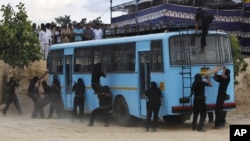LONDON — The watchdog group Human Rights Watch says many world governments downgraded concerns about protecting human rights, in favor of more aggressive measures aimed at countering terrorism. An HRW report published Friday says the attacks on the United States on September 11, 2001, were the catalyst for this trend.
The report says the impact of the attacks in 2001 has not been limited to the United States or even, more broadly, to western nations, but has spanned the globe.
144 countries, it says, have brought in new counterterrorism laws or amended old ones, and in many cases the changes have opened the door to abuse.
Reed Brody is a spokesman for the U.S.-based research group. "What we have seen is that around the world people are using the threat of terrorism - or even making up the threat of terrorism sometimes - to justify measures that violate due process. Peaceful opponents, separatists, political opponents are being labeled terrorists," he said.
Human Rights Watch says it has many examples of how laws to counter terrorism have been misused.
It highlights the U.S. detention without charge of hundreds of detainees at the American base in Guantanamo Bay, Cuba.
In Turkey, the report says hundreds of non-violent protesters have been convicted and jailed under counterterrorism laws, and in Bahrain, opposition leaders have been convicted of criminal charges for criticizing the monarchy’s human-rights record.
"In Ethiopia, students who were writing articles criticizing the government were convicted of crimes such as providing moral support for terrorism," stated Brody.
Andrew Mumford is a counterinsurgency expert at Britain’s University of Nottingham.
Internationally, he says, the rules have completely changed since the suicide attacks on New York and Washington that killed nearly 3,000 people almost 12 years ago.
"The 9/11 attacks engendered the rewriting of the counterterrorism rule book across the Western world and beyond. The shocking nature of the attacks really encouraged the counterterrorism community to really look at the rule books, look at the law books," Mumford said. "And say nothing is now too out of the ordinary to legislate against."
Mumford agrees with the rights group's view that many governments set too low a priority for human rights concerns. The problem, he says, is that by undermining human rights governments perpetuate discontent, which can escalate terror. "A lack of adherence to human-rights considerations when formulating counterterrorism policy is that the failure to adhere to them is entirely counterproductive," he said.
The Human Rights Watch report says some countries have resisted the shift toward tougher counterterrorism legislation. It highlights Norway, where gunman Anders Behring Breivik was tried and convicted this year as a common criminal for shooting dead 69 people and killing eight more in a bomb attack.
The report says the impact of the attacks in 2001 has not been limited to the United States or even, more broadly, to western nations, but has spanned the globe.
144 countries, it says, have brought in new counterterrorism laws or amended old ones, and in many cases the changes have opened the door to abuse.
Reed Brody is a spokesman for the U.S.-based research group. "What we have seen is that around the world people are using the threat of terrorism - or even making up the threat of terrorism sometimes - to justify measures that violate due process. Peaceful opponents, separatists, political opponents are being labeled terrorists," he said.
Human Rights Watch says it has many examples of how laws to counter terrorism have been misused.
It highlights the U.S. detention without charge of hundreds of detainees at the American base in Guantanamo Bay, Cuba.
In Turkey, the report says hundreds of non-violent protesters have been convicted and jailed under counterterrorism laws, and in Bahrain, opposition leaders have been convicted of criminal charges for criticizing the monarchy’s human-rights record.
"In Ethiopia, students who were writing articles criticizing the government were convicted of crimes such as providing moral support for terrorism," stated Brody.
Andrew Mumford is a counterinsurgency expert at Britain’s University of Nottingham.
Internationally, he says, the rules have completely changed since the suicide attacks on New York and Washington that killed nearly 3,000 people almost 12 years ago.
"The 9/11 attacks engendered the rewriting of the counterterrorism rule book across the Western world and beyond. The shocking nature of the attacks really encouraged the counterterrorism community to really look at the rule books, look at the law books," Mumford said. "And say nothing is now too out of the ordinary to legislate against."
Mumford agrees with the rights group's view that many governments set too low a priority for human rights concerns. The problem, he says, is that by undermining human rights governments perpetuate discontent, which can escalate terror. "A lack of adherence to human-rights considerations when formulating counterterrorism policy is that the failure to adhere to them is entirely counterproductive," he said.
The Human Rights Watch report says some countries have resisted the shift toward tougher counterterrorism legislation. It highlights Norway, where gunman Anders Behring Breivik was tried and convicted this year as a common criminal for shooting dead 69 people and killing eight more in a bomb attack.




